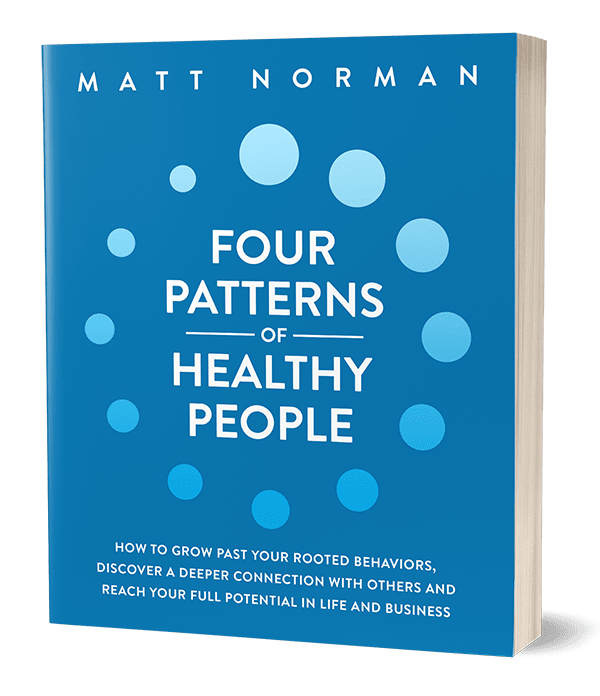Four Patterns of Healthy People: Available Now!
There we were for our regular gathering of close friends to talk about our joys and frustrations from the week. I paused and looked up at the group after telling them about a problem in my life.
“Guys, do I keep repeating the same problems every time we gather, just with different details?”
They nodded.
I’m not alone. My friends have often repeated the same problems with different details too. And I’ve found that my coaching clients also keep repeating the same problems.
These patterns can be difficult to see when we’re in them. We’re like fish swimming in the water without awareness of the water and the currents and movements that keep us doing the same things. Patterns like:
- Addictions to screens, alcohol, eating…
- Triggers or hot buttons that make us more upset than someone else might be
- Fears that cause us to avoid or shrink
- Anxiety, depression, or compulsions that make us fixate
- Family patterns in how we treat others or view the world
- Self-centeredness, leading to rigid expectations and control of others
But again, they’re hard to see — unless you work with a therapist or a coach, or you go through marriage counseling, or you spend two weeks with your in-laws, or you realize the behavior of your child that frustrates you…is behavior they learned from watching you.
That’s why I’ve written this book called Four Patterns of Healthy People, which officially releases today: to help people see their patterns and commit to growth.
Transformation Results in Joy and Impact
People typically default to a fixed assumption about their patterns, if they confront them at all. People assume:
- I can’t.
- It will always be this way.
- I’m just so… She’s just so…
- That’s the way it is.
- I know this already.
- I’m terrible at this.
It just doesn’t have to be that way.
Consider my friend who would hide liquor in his house. All he could think about was sneaking away from his family to drink it to cope with his emotions. He was completely stuck — until an incident made him realize he needed to change, and someone sponsored him through Alcoholics Anonymous.
Or how about tennis star Novak Djokovic’s recent U.S. Open incident, where his pattern of anger resulted in him swatting a tennis ball out of frustration and hitting a line judge in the neck. Hurting this woman, embarrassing himself on national television, and being removed from the tournament with a large fine caused him to post this on Instagram:
This whole situation has left me really sad and empty. I checked on the lines person and the tournament told me that thank God she is feeling ok. I‘m extremely sorry to have caused her such stress. So unintended. So wrong.
I need to go back within and work on my disappointment and turn this all into a lesson for my growth and evolution as a player and human being. I apologize to the [U.S. Open] tournament and everyone associated for my behavior.
Jason Gay wrote in the Wall Street Journal, “As sports apologies go—as any apology goes—that’s not bad. What happened Sunday was a self-inflicted professional humiliation, and credit to Djokovic for not doing the 21st-century usual: blaming everyone but himself.”
Rather than blaming, ignoring, or rationalizing your patterns, you too can self-confront and grow.
Starting today and continuing for the next week, the book is available for purchase on Kindle for $.99. The book includes practical insights, worksheets, and exercises to increase your self-awareness and motivation to grow. Please consider getting a copy for yourself and others.
Thank you!
Matt










Talent acquisition is undergoing a major overhaul. Here are a few ways HR tech-driven sourcing of candidates mimics the executive recruiter process and ensures a seamless hiring experience https://www.peoplehum.com/blog/sourcing-candidates-driven-by-hr-tech-talk-with-karen-azulai